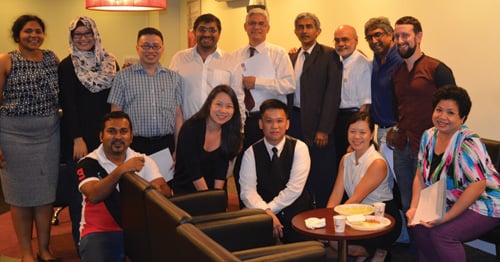Becoming the Next Perry Mason aka
The CLAS Criminal Law Training Programme

Some of the volunteer trainers from the CLAS Criminal Law Training Programme with CLAS staff at an appreciation event held for them on 23 October 2015
Recall the time when you first considered becoming a lawyer. Was it while watching Perry Mason give an impassioned plea in front of 12 stone-faced jurors? Perhaps Harvey Specter in an impeccable suit (of course) striding across the Courtroom with all eyes on him?
For 31 Thursdays earlier this year, lawyers with an interest in practising criminal law and learning how to become the next Perry Mason have gathered in the State Courts’ Bar Room to listen to senior criminal practitioners speak on various topics in criminal law.
Organised by the Criminal Legal Aid Scheme (“CLAS”) Committee of the Law Society, the participants have found these sessions to be tremendously useful, especially so for younger lawyers who are making a foray into criminal law by taking up CLAS cases.
Abraham Vergis, CLAS Committee Chairman, encourages younger practitioners to attend, saying, “This initiative is a very important aspect of CLAS work. It will help CLAS volunteers who do not have enough experience in criminal law to come to terms with the nuts and bolts”.
Over eight months, the Criminal Law Training Programme covered a huge host of topics extending to all areas of criminal practice. General areas that the speakers have taught include criminal procedure; how to handle certain types of cases, eg sexual offences, drug offences; dealing with the police and prosecutors; how to conduct a trial; evidence; impeachment; appeals, etc.
What makes this programme stand out from what has already been taught in Part B or from the occasional CPD course is its comprehensive spread of topics and the wealth of experience that the trainers get to share with attendees. If you are not a frequent visitor to Court 17, this is another chance to get to know these senior lawyers by name and to hear their war stories.
CLAS Fellow, Ng Shi Yang, says, “We get to see how theory is brought to life with their recollections of ‘war stories’, and it has been extremely helpful in practice.”
Justin Tan from Trident Law Corporation agrees, saying that this entire programme has been useful and hopes that it will be held again next year. (It will.)
The senior lawyers themselves also benefit from giving these talks. “This serves a number of purposes, one of them being to generate thoughtful discussions in respect of various issues in criminal jurisprudence amongst all lawyers,” said Suresh Damodara, who taught a module on re-opening cases.
The criminal bar is not a large one, and the experiences which these senior practitioners share has been most welcomed. It is also in these sessions that the camaraderie and fellowship of the criminal bar can be experienced.
Jeremey Pereira from KhattarWong says, “This is very useful for those who do not practise criminal law on a daily basis. It has been informative, and the informal and casual setting makes it easy to ask questions.”
These talks are not just for newly qualified lawyers. Those with more experience in practice also benefit. “It is useful because it updates us and the attendees on the latest developments in aspects of crime. It keeps the trainers up to date and the attendees are always well-prepared,” said Peter Fernando, who taught a module on challenging your client’s statements.
Most of all, we are excited that the criminal bar is expanding. Amolat Singh, who taught a module on direct examination of defence witnesses, says, “It is good that the profession is taking ownership of training young lawyers. These are not just academic nuts and bolts. Seniors teach practical tips and bring it [criminal law] alive.”
The programme was made available free of charge to the CLAS Fellows and was very heavily subsidised for active CLAS volunteers with most of the lessons being completely free of charge and just a handful of the more advanced lessons being charged at a nominal rate of $30. Even for non-CLAS volunteers, with a pricing of $60 per lesson or a package rate of $1,600 for all 31 lessons, this programme was probably one of the most affordable ways to meet one’s entire annual CPD requirement as well as acquire a huge wealth of criminal legal knowledge and network with senior figures in the criminal bar. The only more affordable way available would be to sign up as a CLAS volunteer, accept your first assignment as either Assistant Counsel or Lead/Sole Counsel and then take advantage of the subsidised rates.
Ramesh Tiwary, who taught case planning and trial preparation, encourages younger lawyers: “Crime work is a calling. Please do it if you have a passion”.
Not sure how or where to start? Join us on 14 January next year when the Criminal Law Training Programme commences again! Registration opens from December 2015 and will be available on the Law Society’s website at www.lawsociety.org.sg.
The CLAS Committee would like to record its thanks to all the trainers who volunteered to conduct lessons for the CLAS Criminal Law Training Programme. They are, in no particular order, as follows:
Abraham Vergis
Dr Christopher Cheok
Josephus Tan
Peter Ong
Shashi Nathan
Eugene Thuraisingam
Sunil Sudheesan
Derek Kang
Amarjit Singh
Anand Nalachandran
Steven Lam
Amarick Gill
Peter Fernando
R Thrumurgan @ Thiru
Amolat Singh
Luke Lee
N Sreenivasan, SC
Naresh Mahtani
Iain Potter
Wendell Wong
Ramesh Tiwary
Mervyn Cheong
DJ Siva Shanmugam
Assoc. Prof. Goh Yihan
Suresh Damodara
► Cheryl Ng
Associate
Amarick Gill LLC
